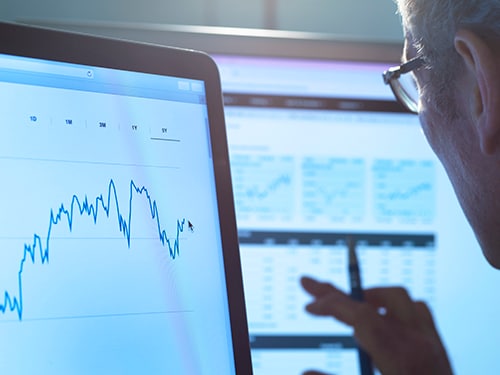When the U.S. economy’s future is uncertain, businesses should consider investing in new technology
Many corporate leaders began 2019 with a positive economic outlook and an optimistic plan of action. Now, bolstered by fast-moving headlines that raise questions without providing answers, some are less than confident in the economy and what they should do next.
In the meantime, businesses are looking to 2020 with an eye on potential investments in technology to help stay relevant, increase efficiencies and protect against a potential cyberattack.
For many, leasing technology equipment can provide valuable benefits, particularly in a volatile economy.
Economic Outlook: Where we stand at the end of 2019
A weak international economy catalyzed declines in U.S. exports and the overall manufacturing sector in the third quarter for the first time since Q1 2016, says Huntington National Bank’s Director of Economics, George Mokrzan. A recession in Germany, a trade-induced slowdown in China, intensified concerns regarding the outcome of Brexit, and general uncertainties regarding international trade were factors weighing down world economic growth in the third quarter, Mokrzan says.
However, these events don’t guarantee a significant downturn and shouldn’t keep businesses from practicing wise operational strategies. There are still signs of growth and progress.
In 2019, the U.S. economy grew moderately in the third quarter due, in part, to solid consumer spending and a decline in the 30-year conventional mortgage rate. Powered by solid labor markets, increasing incomes, a rising personal saving rate, solid balance sheets, and generally favorable financial conditions, consumer spending is forecast to remain the major engine of economic growth in 2020. Despite the international growth and trade policy headwinds, a strong U.S. consumer is forecasted to lead real GDP growth of 2.3% in 2019 and 2.0% in 2020.
In addition, the Federal Reserve held the Fed Funds rate target constant in the 1.5%-1.75% range and indicated that the monetary policymakers do not plan to change the rate in the current economic environment.
Operating with Longevity in Mind
Whether an economic downturn looms or the economy continues growing at a moderate pace, businesses still have to service their customers, stay relevant and maintain operational efficiency.
One step toward accomplishing these goals may be to leverage the latest technology.
Investment in technology initiatives is still growing, with companies looking to increase their short-term spending in an effort to gain long-term efficiency†. In fact, a recent survey of more than 1,000 businesses found that 88% of companies expect their IT budgets to grow or stay steady over the next 12 months‡.
Many organizations are placing priority on user technology, such as laptops, mobile devices, and printers. Since October 2018, investment in computers rose 8.3% year over year and medical equipment increased 5.1%§.
Not keeping up to date with technology may put your business at an operational disadvantage. Companies that do not regularly refresh their equipment risk falling behind their competition and may find themselves unable to upgrade to the latest enhancements offered by new technology, says John Zimmeth, senior vice president of Portfolio Management, Huntington Technology Finance.
All too often businesses that have purchased products such as computers, servers and medical equipment, delay decisions to replace this equipment and keep it for as long as they can, even when refreshing their assets would be beneficial in the long run.
Zimmeth recommends that companies conduct a thorough study of the total cost of ownership of equipment prior to making a purchase versus lease decision, including the escalating costs of maintaining aging technology and the potential for lost business due to obsolescence.
Realize Financial Goals by Leasing
Nearly 80% of U.S. businesses, from small entrepreneurs to Fortune 100 companies, finance the equipment needed to run their organizations¶.
Leasing technology equipment offers many financial benefits to businesses¶ including:
- Managing cash flow
- Hedging against inflation
- Planning expenses for cash flow and business cycle fluctuations
Leasing may also let businesses leverage operating expense funds, help preserve credit lines, mitigate and/or reduce risk, and allow for the acquisition of needed equipment without having to deal with traditional budget processes or utilizing sizeable upfront capital.
Evaluate Your Needs
At Huntington Technology Finance, we can work with you to assess your situation and economic trends and help craft a technology strategy that provides financial benefits, flexibility, and innovation for your business.

